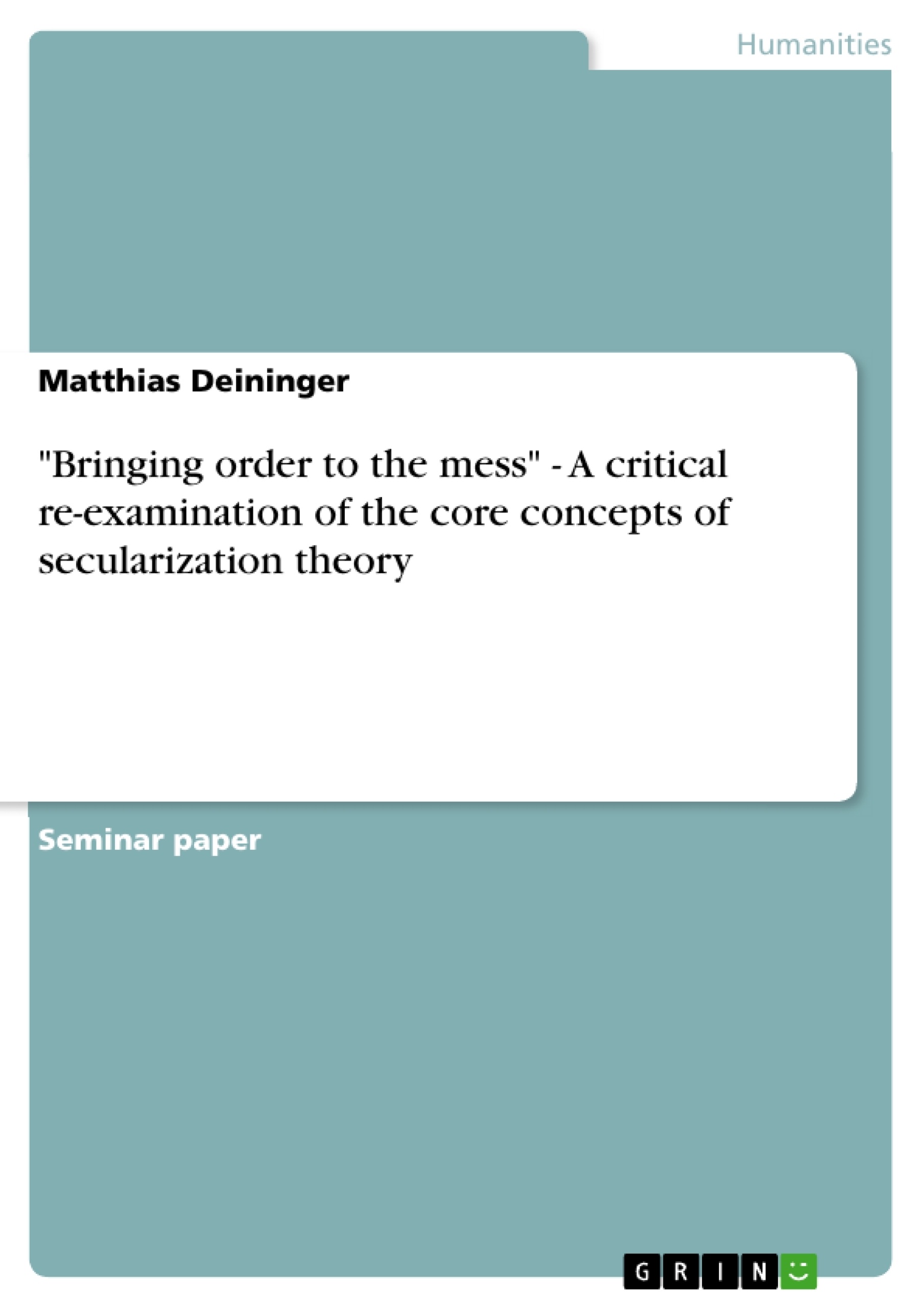Despite Rodney Stark‟s postulate “to carry the secularization doctrine to the graveyard of failed theories“ (Stark 1999:22) or David Martin‟s demand “towards eliminating the concept of secularization” (Martin 1965), the discourse on secularization seems to be as alive as ever. Indeed, from its beginnings to present the idea of secularization lies at the very core of sociological imagination. Hardly any other subject caused as much controversy among scholars as to if and how processes of secularization interrelate with the emergence of “modernity”. This has led to a multitude of publications over the last decades, all redefining, defending, refuting or even rejecting secularization theory altogether. One of the main difficulties resulting from this ever expanding literature on secularization is the diverse and often undifferentiated usage of categories such as “the secular”, “secularization” and “secularism”. Similar to other social-scientific macro concepts the term “secularization” is multidimensional. Depending on the context and academic discipline, it is applied very differently, thus leaving the door wide open for manifold possibilities of interpretations and meanings. This especially poses problems to any empirical researcher; as such an amorphous term with respectively different meanings and ambiguous possibilities of interpretation is hard to operationalize (Casanova 1994: 12). The aim of this paper is therefore, to critically review the main concepts of secularization theory. For this purpose, I will analytically distinguish between “the secular” as a theological category of Western Christendom, “secularization” as a historical process referring to state-church relations and “secularization” as an analytical conceptualization of modern world-historical processes. By doing so, I hope to identify some of the core problems that inevitably appear when trying to apply seemingly self-understanding concepts about the “secular” to other parts of the world.
Table of Contents
- Introduction
- A short history of concepts
- Secularization as a social-scientific concept
- Secularization and functional differentiation
- Secularization and the privatization of religion
- Secularization and the decline of religious beliefs
- Conclusion
Objectives and Key Themes
This paper aims to critically review the main concepts of secularization theory. It will analyze the different meanings of “the secular” and distinguish between its theological, historical, and analytical conceptualizations. The paper will also explore the challenges of applying these concepts to different parts of the world.
- The diverse and often undifferentiated usage of categories such as “the secular”, “secularization” and “secularism”
- The evolution of secularization theory from its theological origins to its social-scientific applications
- The impact of functional differentiation and the privatization of religion on secularization processes
- The relationship between secularization and the decline of religious beliefs
- The challenges of applying Western concepts of secularization to non-Western contexts
Chapter Summaries
The first chapter introduces the topic of secularization theory, emphasizing its enduring relevance despite criticism. The chapter highlights the challenges in defining and operationalizing “secularization” due to its multifaceted nature and diverse interpretations. The second chapter delves into the historical development of the concept of “the secular” and traces its origins from its theological roots in Western Christendom to its subsequent social-scientific usage. It analyzes the evolution of the concept from its initial temporal connotation to its broader applications in understanding modern social transformations.
Keywords
The key terms and focus topics of this paper include secularization, secular, secularism, functional differentiation, privatization of religion, decline of religious beliefs, modernity, Western Christendom, globalization, social-scientific concepts, and comparative studies.
Frequently Asked Questions
Is secularization theory still relevant today?
Despite some scholars declaring it a "failed theory," the paper argues that the discourse on secularization remains central to the sociological imagination.
What is the difference between "the secular" and "secularization"?
"The secular" is often a theological category of Western Christendom, while "secularization" can refer to historical state-church relations or modern social processes.
How does functional differentiation relate to secularization?
Functional differentiation describes how different social spheres (like law, science, and religion) become autonomous, which is a core concept of secularization theory.
What are the challenges of applying secularization theory globally?
The paper identifies problems when applying Western-centric concepts of "the secular" to non-Western parts of the world where historical contexts differ.
What does the "privatization of religion" mean?
It refers to the process where religious beliefs and practices increasingly move from the public sphere into the private lives of individuals.
Why is the term "secularization" hard to operationalize?
Because it is a multidimensional and "amorphous" term with diverse interpretations across different academic disciplines and contexts.
- Quote paper
- Matthias Deininger (Author), 2012, "Bringing order to the mess" - A critical re-examination of the core concepts of secularization theory, Munich, GRIN Verlag, https://www.grin.com/document/202798



